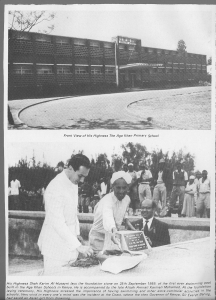Highlights of East African Tour 1959-09-25
Highlights of 1959 East African Tour – excerpts from Speeches
His Royal Highness Prince Karim Aga Khan Imam-e-Zaman, made an extensive tour of the three territories of East Africa, namely, Tanganyika, Uganda and Kenya in September – October 1959. Following are excerpts from some of the speeches delivered by His Royal Highness during this tour:
1. Press Conference Kampala, Uganda
September 18, 1959
Source: Speeches II pg 8
At a Press Conference in Kampala on 18-09-1959, His Royal Highness reiterated that he would not give advice of a political nature to his followers other than that they should identify themselves with the development of the countries of their adoption and be loyal citizens. He said that whether they formed parties or joined existing ones was entirely a matter for the individual’s decision. He stressed that his authority was purely spiritual. “The message I will always give is that humanity cannot deal with the present day problems without a basis of religion”
2. September 25, 1959
Source: Speeches II pg 9
On September 25th 1959, His Royal Highness Prince Karim Aga Khan Imam-e-Zaman, paid tribute to the “gallant gesture” of Governor of Kenya, Sir Evelyn Baring, in saving the life of an Asian girl who was in danger of drowning at Malindi early this month.
In a Speech at the opening ceremony of the new swimming pool at the Aga Khan Primary School in Nairobi, he said he was “…was personally deeply grateful as is My community.”
He suggested that it might be advisable in the future - particularly after the incident which involved Sir Evelyn, that the ability to swim were made a compulsory qualification for a degree. This was the practice at Harvard University, of which he is a former student, where they “refuse to give you your degree until you can swim two lengths of swimming pool”
As in other speeches on his tour, in East Africa, he expressed the hope that more candidates, and particularly African children, would apply to attend his community’s schools in the Colony.
3. Nairobi, Kenya
Civic Luncheon, Nairobi City Hall
August 27, 1959
Source: Speeches II pg 9 – 10
Speaking at a Civic Luncheon on 27-09-1959, in his honour at Nairobi City Hall on Saturday, the Aga Khan said he had been struck forcibly on this visit by the powerful role newspapers could play in providing the means of communication between the different peoples who lived in the territories. Many distinguished Africans whom he had met, both in Kenya and Uganda, had no idea that the Aga Khan schools were open to their children and that, in fact, in Uganda, nearly a third of the places in those schools were occupied by Africans. The Aga Khan asked how many Europeans in Nairobi knew that “our hospital is open to them, just as much as it is to any other Kenyan.”
Understanding between different races was a subtle and complex subject, and he said he would be the last to suggest that it could be created by artificial stimulants. The will must be there and spontaneity was essential, but above all there must be a foundation of accurate, objective knowledge. Here was a vital function for newspapers, radio, and before long, perhaps, television. It was a function that could be as important as safeguards for democracy as the most ironclad constitution. Referring to a new building, one of many springing up in Nairobi, which he had opened that morning, he said; ”it was a symbol of faith in the future of the country.” Despite periodic outbursts of gloom from the city of London, he felt certain that Kenya would overcome her economic problems.
There were many of these still to be solved, not least in the sphere of politics, but with mutual goodwill and tolerance, he sincerely believed that Kenya would yet become an example and inspiration, not only to Africa but to the entire world. Welcoming the Aga Khan, the Mayor, Ald. Mrs. M. Needham Clark, said, “Kenya could get all the social services it required much more quickly if all communities adopted the Ismaili practice of contributing money, as a religious duty, towards charity and welfare. The colony could be built up into a “wonderful country”, if everyone followed this “fine example.” The Ismaili community in East Africa showed how things could be done instead of complaining about what was not done by Central and Local Governments.
4. Dar es salaam, Tanganyika
Aga Khan Boys School
October 10, 1959
Source: Speeches II pg 10
“…Ismaili students in Tanganyika should always consider the territory as their home.” His Royal Highness Prince Karim Aga Khan Imam-e-Zaman told pupils of the Aga Khan Boys’ School, Dar es salaam on 10-10-59. He said that in choosing a career they should not only consider the present situation, but should look ten or twenty years to the future. He was pleased to hear that many of the boys were going to be trained as teachers, engineers, doctors and accountants and that the girls wanted to enter such professions as nursing and teaching.
“Whatever professions you decide upon,” he said "stick to it. Make sure you work hard and get to the top.”
- 5805 reads
 Ismaili.NET - Heritage F.I.E.L.D.
Ismaili.NET - Heritage F.I.E.L.D.